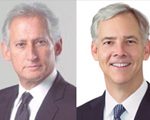Jo Hopper and her step-children won an $8 billion jury verdict against J.P. Morgan last year over the handling of her late husband’s estate. But a fight over attorneys’ fees in a Dallas probate court this week shows the real battle is just beginning. Natalie Posgate has the details in The Texas Lawbook.
More Stories
SCOTX Ponders Limits of Liability in Oilfield Workers’ Auto Accident
An auto accident involving oil field workers in West Texas has raised some potentially important issues of liability and the limits of worker supervision at the Supreme Court of Texas. The Texas Lawbook has details on the oral arguments in Painter v. Amerimex.
Akin Gump Promotes 15 to Partner, Three in Texas
Two of the newly-promoted partners practice in Dallas, while one splits time between Dallas and Houston.
DBA Elects Michael K. Hurst President
Hurst will be inaugurated on January 20.
Former UT Medical Branch VP of Legal Affairs Officially Joins Morgan Lewis
Gregory Etzel was part of a new group of healthcare attorneys Morgan Lewis announced in December, but he wasn’t expected to join the firm until after the new year.
Corp. Deal Tracker Weekly Round-Up: 9 Firms and 47 Texas Lawyers Close 2017 with 10 Transactions Worth $2.5B
The final week of 2017 stayed true to history: the numbers were low and the activity was slow. Weatherford International led the deals with an important surprise involving a previously announced joint venture with Schlumberger. Claire Poole has the specifics and the stories behind them in The Texas Lawbook.
BakerHostetler Elevates One to Partner in Houston
Will Daugherty practices with the firm’s privacy and data protection team.
Haynes and Boone Names Nine New Partners
All of the newly-elected partners office in one of the firm’s DFW locations.
HTLA Announces New Leadership
Houston trial lawyer Daniel Horowitz was elected president.
Analysis: Delaware Supreme Court Reaffirms that Deal Price is Indicator of Fair Value in Appraisal Actions
In one of the most important court decisions of 2017, Delaware’s highest court used litigation involving Dell to underscore the legal principle that deal price should be accorded significant — if not complete — deference in determining fair value in appraisal actions. The opinion is not the death knell of M&A appraisal litigation, but it will further temper the escalation of such legal challenges from arbitrageurs that acquire shares after the announcement of an M&A transaction.
